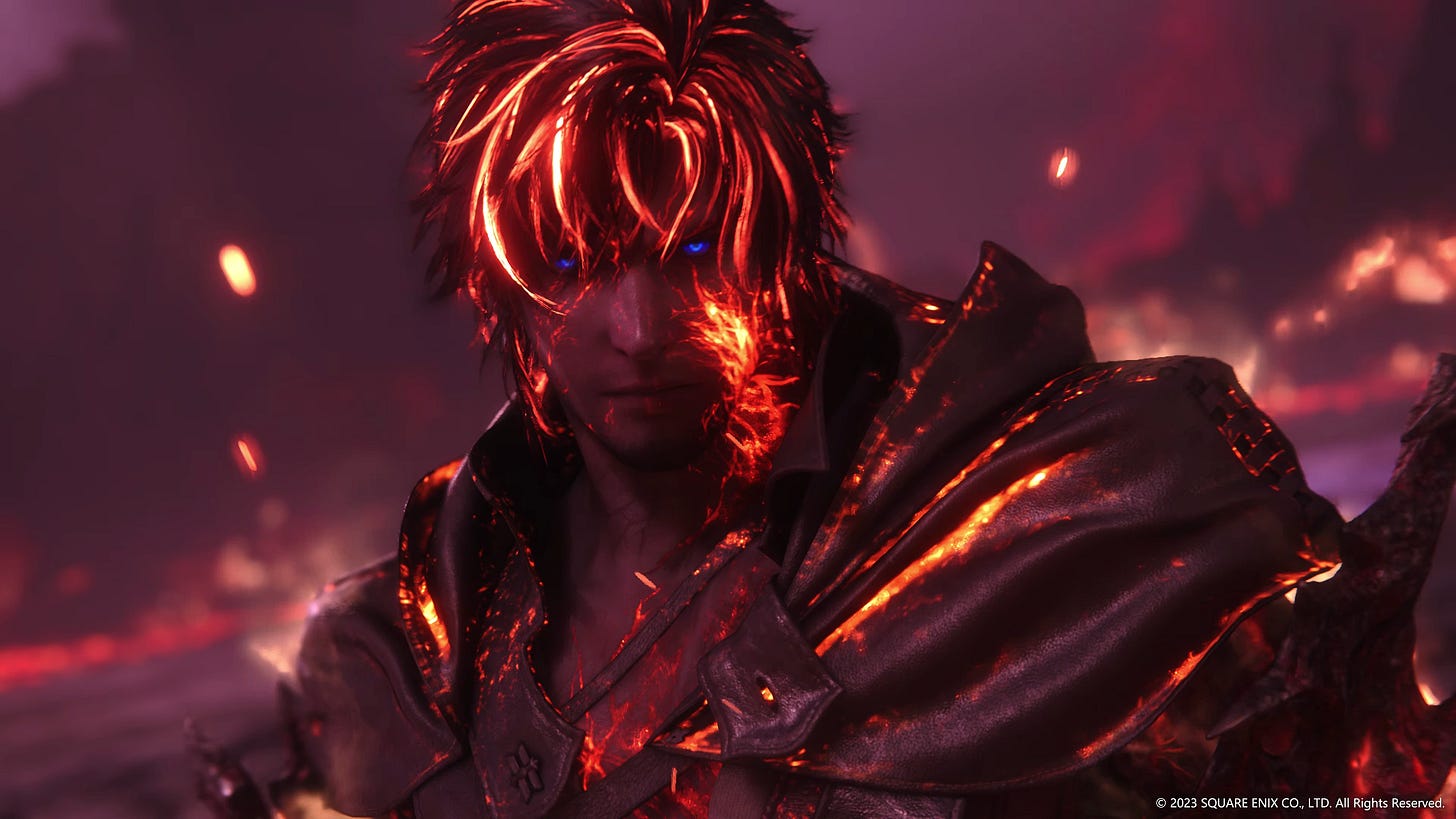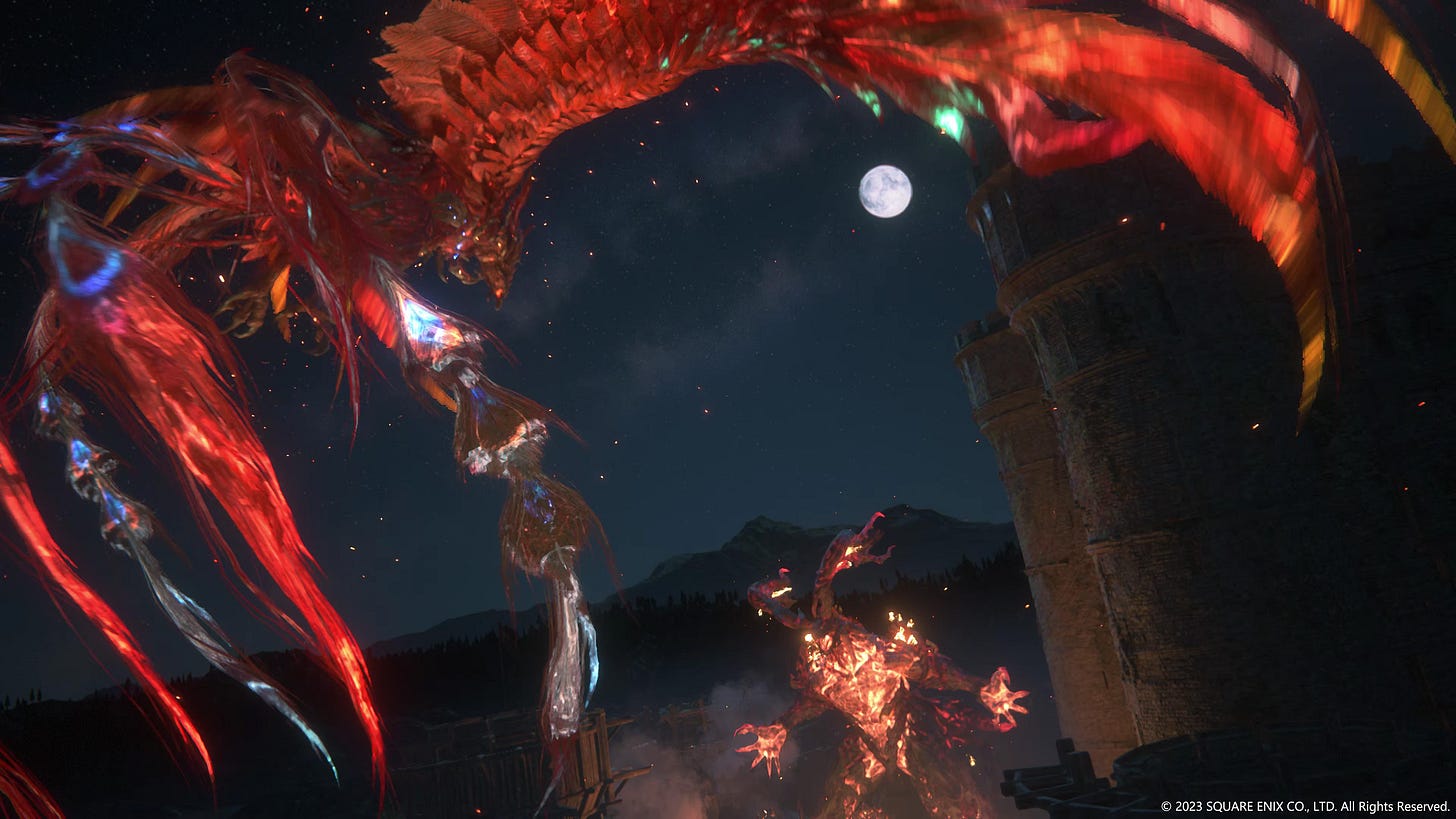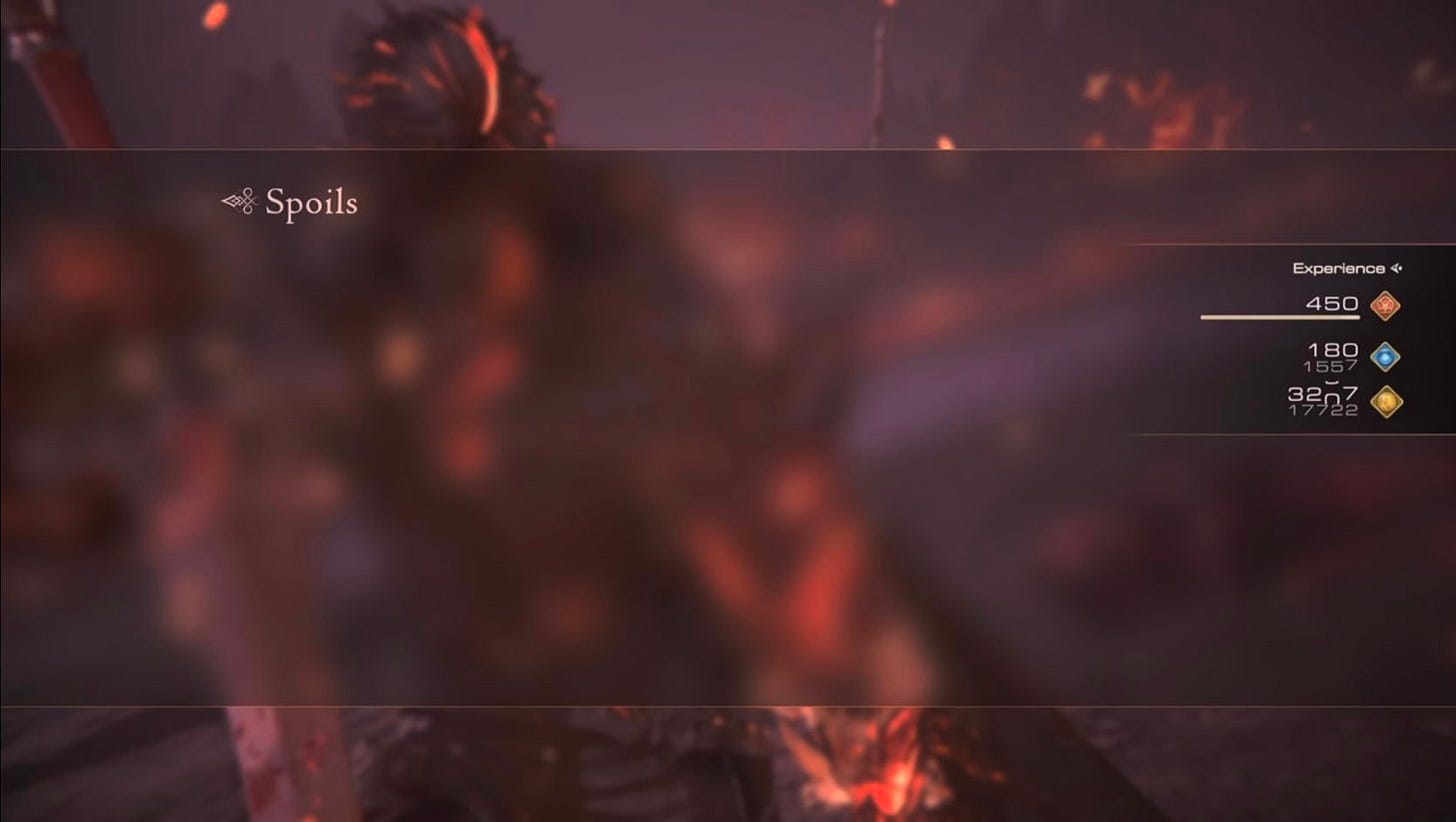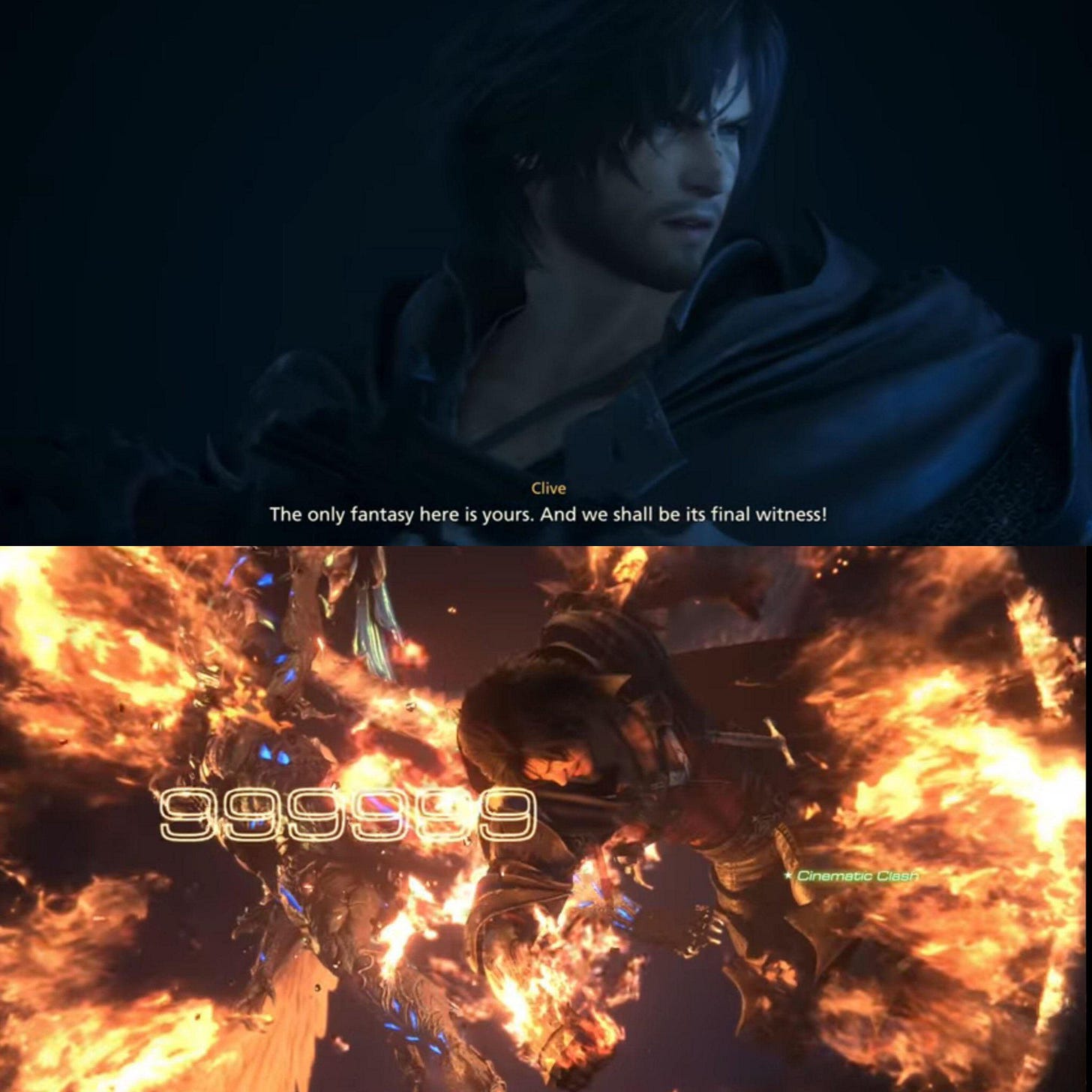Final Fantasy XVI Won't Let You Feel
Final Fantasy XVI forgoes all RPG elements in favor of mindless button mashing.
“JOSHUA!”
That’s my name! Imagine my delight to find that Final Fantasy XVI’s protagonist, Clive, would scream this hundreds of times throughout the game to his younger brother, Joshua!
Clive and Joshua come from a royal family, sons of a just and noble king. Joshua, though the youngest, is the heir to their fathers throne because he is a Dominant, a powerful magic wielder chosen by the gods themselves to harness their power and take on their forms as needed. Joshua holds the power of the mighty Phoenix. Their mother greatly favors Joshua for this reason but none of this gets in the way of the brothers being very close. Early into the game, Clive completes his training to be Joshua’s sworn shield— his protector.
This happens just in time, too, because their castle is invaded almost immediately. In the chaos, Clive and the king try to get Joshua to safety but the king is made vulnerable and assassinated in front of them.
Joshua, a child with a powerful god inside of him, transforms into the mighty Phoenix to protect his kingdom. He flies off raining fiery justice on their invaders while Clive begins to suffer a terrible headache— a headache named Ifrit. Clive transforms into the powerful fire demon, revealing to himself for the first time that he, too, is a Dominant. Unable to control his new power however, he goes after the Phoenix.
The two engage in a clash of massive proportions, slinging fireballs and punches as they soar over the castle. In the end, Ifrit overtakes the Phoenix, Joshua. Clive, conscious from inside Ifrit but unable to intervene, watches the endless barrage of punches his own body throws against his brother. He screams and cries, begs himself to stop, to no avail. Ifrit, Clive, rips through the Phoenix, Joshua’s lifeless body with a final fiery punch. All he can do is scream: “I swore I would protect him! JOSHUA!”
Then the demo ends.
I wouldn’t pick up the full version of FFXVI for another couple months. It allowed me to sit in Clive’s guilt, and process his emotions in that final scene. It’s a contemplativeness that I would yearn for again as I played the rest of the game. In the full game we then jump 13 years later. Clive conceals his identity and lives as a mercenary, running from his past certain no one would understand or forgive him if they knew the truth. Least of all himself. Having experienced the weight of his actions along with him, including a time gap between that moment and the current, his anger took on a fullness, a realness to me like few other games. I understood Clive’s anger, his contempt for himself, and his readiness to keep running and fighting. He would do anything to just forget. This would be the last time Final Fantasy XVI would make me feel this way.
XVI is a fast game in every sense of the word. Compared to every other Final Fantasy game, it’s combat is breakneck with combo flurries and magical abilities available with simple button presses. This is a far cry from the turn-based combat of traditional Final Fantasy games. This could be seen as a simplification in and of itself but not all action RPGs need be simple. Unfortunately, however, this is the case as most all combat encounters can be completed by simply mashing the attack button until you stagger the enemy and then unleashing all of your magical abilities at once, rinse, and repeat.
Slow or turn based action is best for story. I wrote about why that is.
Worst of all, XVI gives no time between lofty emotional scenes such as the one at the end of the demo. There are no moments of reprieve, of contemplation, which greatly impacted my enjoyment and connection to the demo and Clive as a character. That moment was artificial. Had I played the game start to finish without trying the demo first and giving myself time in between, the game would have carried on at this pace even from the start. Would I have felt the same way going straight into the game with no down time? No, I would not, as evidenced by the other similar moments throughout the game which all fell flat.
For example, about 15-20 hours in (still firmly in the first act of this 60+ hour experience), Clive wrestles with accepting his actions. For 13 years he placed the blame on Ifrit, the fire demon which he could not control. He was possessed and therefor free of responsibility. All that time, he spent in search of the demon who had done this and vowed to have his revenge, ultimately to find that it was within him. As much as he tried to run and deny that fact, it wouldn’t change. A dramatic, symbolic, and, yes, fiery battle ensues between Clive the person and Ifrit, also Clive. The battle’s are impactful and emotional, as Clive first battles Ifrit as a means of revenge. Then, Ifrit becomes a dark version of Clive himself and the battle becomes about Clive fighting the demons of his own past and the parts of himself he hates. Finally, Clive realizes he can only make it out of this fight by calling on the powers of Ifrit as he wraps himself in flowing embers, symbolizing the acceptance of himself, his past, and his guilt. The final phase is a blazing fast power trip as Clive unleashes the full fury of over a decade of repressed emotion! In a final cathartic blow, Clive cries out and demolishes the demons of his past, the music crescendos, full acceptance and forgiveness of self is in reach! Then mid celebration:
The number of times a climactic, emotionally resonant moment is interrupted by my XP and loot gained from the video game fight is all of them. One hundred percent of the time, this victory screen assaults your view, halting any opportunity to feel the emotions of the characters. It is as if the game itself is at odds with Clive’s emotional progression. It acts fully counter to the internal conflict Clive is tasked with confronting: feeling, contemplating, and accepting, and replaces it with “Spoils.”
There was a part of me that thought this had to be on purpose the more it continued to happen, that there was some reason for it. It’s true by the end that God (yes, that God, the creator of the universe) is in fact trying to hinder Clive’s emotions to make him an empty vessel for his return, but somehow I don’t think he’s doing this by showing me how much money and skill points I just gained.
The video game simply video games way too hard, and to make matters worse, the game is simplified enough as to render most of your “Spoils” useless. Leveling is automatic, all equipment upgrades linearly so there are no actual choices to be made with your spoils. It is all for nothing.
Clive shows real growth throughout Final Fantasy XVI, learning to forgive himself, accept himself, and allowing others the opportunity to do the same. He turns his guilt to motivation to help the people around him and he becomes a beacon of hope for a growing community in the midst of chaos and war. I don’t get the feeling the developers took their own advice on this, constantly undermining their own messaging with what can uncharitably be seen as pop-up windows, blocking your view of the true emotion on screen.
Those first hours in the demo still stick with me. It’s a powerful hook that’s squandered over and over, pummeled to the ground with fiery firsts as I scream helplessly for them to stop. As Clive continues to develop deep bonds with the rest of the characters of the game, Jill, Cid, Gav, and (surprise) Joshua (the Phoenix. Should’ve seen that one coming), they continue to be interrupted by loot, spoils, things. They are petty distractions covering the heart of the game, like Clive locked inside the powerful Ifrit exterior. Therein lies the motif: acceptance of the whole, good and bad, but if Final Fantasy XVI truly accepted itself, it wouldn’t need to hide behind these video game trappings.









Still waiting to read this article after I finish the game, but I played the first 6 hours today and loved it. Unfortunately, my mom loved it too, so I won’t play it until I visit her again 😆
First impressions: It just cuts straight to what I love in FF. Story. Summons. Character drama. The gameplay is mashy, but also… fine? I got a few game overs, but then with more potions and more successful dodges, was able to keep going. And that’s fine. Much better than the “Well, I guess I have to grind” scenarios or the head-scratching “What in the world am I supposed to do?” moments that kill momentum. I almost feel like the game was made for old fans of the franchise who don’t have the patience to actually play games anymore.
That screen-grabbed quote from Clive? Amazing.